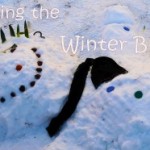The Great Summer Guide to Homeopathic Wellness
Blue skies, a little breeze and lots of sunshine – is there anyone out there that does not enjoy the summer? Alas, even in this nicest time of the year, health problems can and do occur. Avoid those nasty summer plagues and enjoy this wonderful time of year to the fullest – with some helpful hints from your homeopath!
Here are some of the summer’s most common complaints, and gentle methods of how to prevent or treat them:
Blisters on the lips
(Herpes labiales)
These “fever blisters” on the lips caused by herpes viruses are often a reaction to intensive exposure to the sun. They can be really upsetting to have during your holidays! Consult with your doctor or homeopath if the herpes illness manifests in the area of the eyes. Generally, a herpes simplex infection is a sign of a weak immune system, which is why special attention should be paid to this area. Taking a tincture of Echinacea diluted in a little water 3 times per day before meals would be very beneficial. You can also treat the blisters themselves several times a day using Calendula (Marigold) cream.
Homeopathic medicines are quite effective for herpes labiales, including Natrium Muriaticum for sore, infected blisters, Rhus toxicodendron for burning, red blisters, or Hypericum for blisters which are especially painful, like in neuralgic complaints. There are also many other remedies available. Your homeopath will choose the remedy best suited to you.
Cardio-vascular Troubles
Many people struggle with a weakened cardio-vascular system when they encounter climate changes. This is particularly true for sensitive, uptight and stressed persons who are often coping in their vacation with the changing and variable atmospheric conditions – they are sensitive to changes in the weather. This disposition generally has hormonal causes. In particular, the hormone Serotonin is released excessively under these conditions. This tissue hormone stimulates the smooth muscles of the blood vessels and other organs. But it influences the central nervous system too.
Common complaints are fluctuating and unstable blood pressure, fatigue, exhaustion, inefficiency, irritability, vertigo, headache, circulatory disturbance, ringing in the ears, pressure in the head or drowsiness.
It is important here to strengthen your weakened cardio-vascular system. Following Kneipp’s cure works really well, that is, you take a shower in the morning alternating with hot and cold water, or you tread water. It is also important to watch your breathing. Many people breathe wrong or too shallow. A healthy person is able to breathe in 3 liters of air in one single breath, but most manage only 1 or 2. Proper breathing means: one breath per every 4 heart beats.
People with a weakened cardio-vascular system should seriously practice good breathing techniques and additionally do breathing exercises outdoors in the mornings and evenings: breathe in fresh air through the nose and breathe it out through the mouth making a hissing noise. Use your stomach muscles to help at the end. Repeat this for 10 times. Pollen is also helpful for people with cardio-vascular complaints. They contain more than 100 different substances (vitamins, minerals and enzymes) that have a vitalizing action on the organism. You take 1 teaspoon full of pollen once per day. Lavender drops diluted in a little water and taken before meals are helpful as well.
Some homeopathic medicines that are very effective are Gelsemium for circulatory issues accompanied by headache, palpitations and a dazed feeling, Rhododendron for sensitivity to changes in the weather accompanied by rheumatic pains, or Bryonia for malaise, especially from warm and humid, tropical weather. As always in homeopathy, careful selection of your remedy by a licensed practitioner is advised.
Constipation
Some tourists, when they travel into different climate zones, react with sluggish bowels or constipation, which is often caused by hormonal changes. Side effects such as a feeling of being unwell or full, flatulence, bad breath and pressure in the stomach are all too common.
It is advisable to quickly change your diet to include primarily vegetarian foods: vegetables, fruit, rice, potatoes and whole wheat products. In tropical regions, only cooked and peeled food should be eaten. Chew your meals well! Also, have 15 to 20 g of wheat bran every day. And, drink lots of liquids (tea, mildly carbonated mineral water)!
You can also drink a glass of mineral water in the morning right after waking. Drink it sip by sip – do not gulp it down. Proven natural remedies for moving your bowels are plum or fig syrup (1tbsp 3 times daily after meals). A slice of apple with a little honey spread on it has a slightly laxative action. Also, unsquashed linseeds well up in the colon and favour the passage of bolus (take 1 – 3 tbsp. with water 3 times per day. Taking 1 tbsp. of dandelion juice 3 times per day before meals will also help.
If you need more help with your digestion, your homeopath may recommend the remedies Alumina in cases of difficult stool with agonizing pressing as well as dry stool, Graphites for constipation that lasts for several days and painful rectal fissures, or Lycopodium for constipation accompanied by flatulence and noises. Among these and many others, your homeopath will choose the right remedy for you.
Traveler’s Diarrhea
When travelling to tropical countries, diarrhea is the #1 travel sickness. There is increased, watery bowel movement accompanied by uncomfortable stomach cramps, and often vomiting. If your diarrhea is accompanied by blood and fever, see a doctor right away! Diarrhea is often triggered by microorganisms (e. coli, giardia, amebae, viruses and worms), which are present in the colons of about half of the population in tropical countries. But the carriers do not get sick – they are immune to these agents).
However, excreted parasites can be transferred to tourists in several ways, for example by flies or through food. The best protection is to observe certain guidelines when it comes to food:
Eat only freshly cooked food which is served hot. Fruit should be peeled prior to consumption. Do not use uncooked tap water (use mineral water for brushing your teeth). It is best to avoid fish, seafood and raw meat altogether. Do not have any open drinks, foods and ice cream which is offered on the streets. A cold buffet and raw salads should also be avoided. Further, do not use any towels in washrooms, and wash your hands thoroughly before each meal.
The person suffering from diarrhea should know that lost fluid must be replaced, by at least 2 – 3 litres per day. Freshly pressed fruit juices (without peels), chamomile or peppermint tea mixed with a little nutmeg, and hot broth are suitable.
It is not wise to take charcoal or other “plugging” medications immediately to stop diarrhea as this will prevent the contaminants from being excreted.
You can protect yourself from travel diarrhea by taking 1 drop of eucalyptus oil in the morning and 1 drop of savory oil in the evening, both diluted in a little tea or fruit juice.
Some remedies which your homeopath may recommend include Aloe for diarrhea accompanied by cramps during stool and rumbling in the intestines, Podophyllum petaltum for explosive diarrhea with sputtering, or Sulphur for burning pains during diarrhea and offensive gas. There are many others. Your homeopath will choose the right remedy for you.
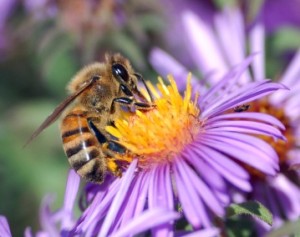 Insect bites and stings
Insect bites and stings
(bees, wasps, mosquitoes)
For bites in the mouth or throat, consult your health care practitioner immediately. The lips, eyes and ears are also very sensitive. Some people get severe allergic reactions and can end up collapsing.
But if it is an uncomplicated insect bite you are dealing with, then there are several possibilities to get relief from burning, swelling, itching and pain. First, if possible, the stinger needs to be removed carefully. Then, the puncture wound and the area around it should be rubbed with an onion half, which is very effective relief of complaints. The itching skin should not under any circumstances be scratched open, as that would only invite infection.
Homeopathic medicines also give relief, for example Apis for bee and wasp stings with stitching and burning pain and slightly red swelling, Urtica for the formation of hives around the puncture wound and burning as from stinging nettles, or Ledum if blood is oozing out of the puncture wound and this is followed by redness and swelling.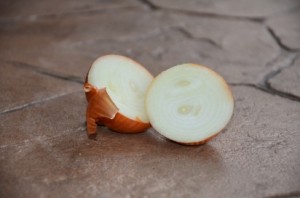
How to protect yourself
There are some effective means to protect yourself. It is important not to wear any flower-based or sweet perfumes which may attract the insects. You can also use sprays and lotions without DEET to keep the biting and stinging nuisances away from you. In order not to be bothered by biting insects in your sleep, you could burn some incense or let some eucalyptus oil evaporate in an oil lamp. In tropical areas where Malaria is common, a mosquito net should be used.
Jetlag
 Many people travelling by airplane to distant places are dealing with jetlag, that is, difficulty in adjusting to different time zones. Normally, our body clock works in a 24-hour rhythm. But when there is a massive time change, often health problems like fatigue, sleeplessness, irritability and loss of appetite occur. You can prevent these complaints by following a few simple steps:
Many people travelling by airplane to distant places are dealing with jetlag, that is, difficulty in adjusting to different time zones. Normally, our body clock works in a 24-hour rhythm. But when there is a massive time change, often health problems like fatigue, sleeplessness, irritability and loss of appetite occur. You can prevent these complaints by following a few simple steps:
Get one extra hour of sleep per night a few nights before you depart. Do not drink any coffee three days before your flight. Plan your flight so that you arrive at your destination in the evening, have a light meal and go to bed before 11.00 p.m. local time. Drink lots of liquids during the flight, but avoid alcohol. Upon arrival at your vacation destination, take the first day to really relax and don’t go off on excursions right away. Light meals will help your body to better adjust to the time change.
If you still have problems, homeopathic remedies are helpful, for example, Eupatorium Perfoliatum for fatigue, stiff muscles and pain in the bones, Cocculus for vertigo, lack of sleep and feeling unwell, or Nux vomica if you have a headache as from a hangover. Your homoepath has the right remedy for you.
Pink Eye
(Conjunctivitis)
Pink eye often occurs after intensive exposure of the eyes to the sun. Poor sunglasses, draft, air conditioners, dirty water or an allergy to sun screens can be other contributors. First signs are redness of the eyes with tearing, sensitivity to light, itching, burning and roughness.
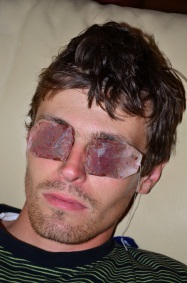 If there is no yellow pus coming from the eyes (see your doctor immediately in this case) you can treat your eyes with Chamomile compresses first. To do this, wet a Chamomile teabag with lukewarm water and put it on your closed eyes for approx. 15 min., several times a day. You may follow up with eyebright (Euphrasia) eye drops, which will give additional relief.
If there is no yellow pus coming from the eyes (see your doctor immediately in this case) you can treat your eyes with Chamomile compresses first. To do this, wet a Chamomile teabag with lukewarm water and put it on your closed eyes for approx. 15 min., several times a day. You may follow up with eyebright (Euphrasia) eye drops, which will give additional relief.
Homeopathic remedies are also helpful, for example Apis for watery, red swelling, Belladonna for an acute, dry infection without tearing or Hepar Sulph for very sensitive eyes (sensation of sand in the eyes) and yellowish thick secretions. Among the many remedies available, your homeopath will be able to choose the right remedy for you
Gentle help for Sun Allergies
An estimated 15 % of the population is allergic to the sun, that is, their skin is oversensitive to the sun’s ultraviolet rays. The allergy often begins within hours or a few days after sunbathing, and expresses itself in itching or burning blisters on the skin, redness, scales or nodules.
It is important that a person allergic to the sun gets used to UV exposure gradually. The time span for the daily sunbath is increased from 15 minutes to 30 minutes to 45 minutes, whereby you need to be extra careful between the hours of 11.00 a.m. and 3.00 p.m.
In order to protect your body from allergic reactions, you can take a tincture of Calendula, diluted in a little water, 3 times daily starting a few days prior to and during your vacation.
Some helpful homeopathic medications are Natrium muriaticum for herpes-like rashes with fever blisters, Clematis Erecta for red, burning skin with small blisters that break quickly and crust over, or Hypericum for extreme sensitivity to light with a rash consisting of small nodules.
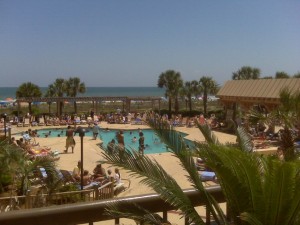
Sunburn
Prevention and Therapy
Part of the prophylaxis is responsible sunbathing with gradual extensions as explained above under the chapter of Sun Allergies. Of course, it is also necessary to apply a suntan lotion with a high sun protection factor. Should you still get burned, avoid direct exposure to the sun immediately! You can tell the beginning of a sunburn when you gently press your finger on the exposed skin areas. If the skin turns white after this, but the surrounding area turns pink, then it is high time you get into the shade and cover yourself with loose clothing, so that the burn does not get any worse.
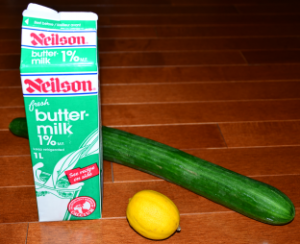 You can relieve first complaints by covering the affected areas with wet, cold towels. If you feel very hot, you can shower every 15 minutes and rub your skin with soft white cheese (Quark). You can also apply buttermilk to the affected area or dab it with a slice of lemon which may burn a little in the beginning, but which is soothing over time. Cucumber juice is also effective.
You can relieve first complaints by covering the affected areas with wet, cold towels. If you feel very hot, you can shower every 15 minutes and rub your skin with soft white cheese (Quark). You can also apply buttermilk to the affected area or dab it with a slice of lemon which may burn a little in the beginning, but which is soothing over time. Cucumber juice is also effective.
Homeopathic medicines can help too, for example Belladonna for a sunburn with a feeling of heat (not so much burning) and throbbing sensations, Cantharis if the skin burns a lot and there are large, light water blisters, Rhus toxicodendron for crimson red skin with small, water filled blisters and a feeling of a shattered body.
Excessive Sweating
What to look out for in deodorants
Being drenched in sweat is not only uncomfortable when you are in the office but also while on vacation. If there is an odour to your perspiration, you will likely be labelled as “unkempt”. The cosmetic industry offers special chemical products, the so called deodorants and antiperspirants. Deodorants cover up the body’s odour by scents, they inhibit the growth of bacteria and restrict the bacterial decomposition of perspiration. Antiperspirants contain powerful astringent substances which reduce the production of the sweat glands by half.
Generally, deodorants and antiperspirants are applied under the arms, the areas where the lymphatic system including its lymph nodes work hardest. In the long run, these products suppress lymphatic functions, which may have harmful effects on your health. Disagreeable substances can thus be infiltrated into the organism through the lymph vessels and it is not unusual for skin infections, eczemas, itching rashes or inexplicable susceptibility to illness to develop.
While deodorant sprays dominated the market years ago, they have been replaced today by deodorant sticks, roll-ons and pump spray bottles. But numerous products still contain ingredients which are damaging to your health, like the bacteria eliminator Triclosan, apart from aluminum salts, parabens and allergic coloring agents. Regarding the deodorant roll-ons, the aluminum salts should be assessed critically as they not only attack the fibres of our clothing, but also compromise the natural functions of the skin. Furthermore, Triclosan was discredited a few years ago as it is contaminated with cancer causing dioxins during production. Preservatives splitting off formaldehyde have cancerous effects too.
In spite of warnings from consumer protectionists, such dangerous substances are still used in cosmetics. Furthermore, the packaging of numerous products does not fully declare what the ingredients are.
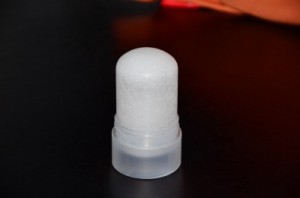
Alternatives are pump spray bottles with essential oils of botanical origin or deodorant crystals. These products are recommended especially for persons suffering from allergies to dyes, scents and conservatives. The crystals are distinctly additive-free. They are made exclusively of crystallized alum, which is said to prevent the growth of sweat inhibiting bacteria on the skin. When buying these crystals, it is important to look for a label stating that the product is allergy tested and skin-friendly. Because there are cheap products available that are made of simple, crystallized, technical potassium aluminum alum. These could, just like the aluminum salts in the plain deodorant products trigger skin reactions. The more expensive products on the other hand, consist of fine alum crystallized many times over. When using deodorant crystals, you should further consider using pH neutral soaps for your daily hygiene so that the acid protection layer of your skin remains intact.
How to cure sweating
Sweat glands should not be clogged up by creams and ointments if possible. The uncomfortable complaints require a holistic treatment taking into account disturbances of the kidney, liver, thyroid, nerves and digestion. A person’s lifestyle needs to be considered in the therapy as well.
Taking juniper berries is a good way to get started with the treatment. On day 1 chew one juniper berry after meals, on day 2 take 2, on day 3 take 3 and so on until day 12, when you chew 12 berries after meals. Following this, reduce the dose by 1 berry daily until there is only 1 berry left when you are on day 24. You need 124 juniper berries altogether, which will purge and drain the body of water, thus regulating the natural breathing of your skin.
In combination with this regime, you can take 15 – 25 drops of a salvia tincture (sage) diluted in a little water before meals.
Daily showers of hot alternating with cold water will be helpful too. You should further not wear any clothing made of synthetic fibers and observe your daily hygiene. Salt, coffee, black tea and spicy food should be reduced.
Your homeopath may further recommend the remedy Sulphur if your sweat has a bad odour, Mercurius solubilis if you are dripping in sweat (even at night) or Sambucus for hot sweating. As mentioned before, there are many homeopathic remedies available. Your homeopath will carefully choose the one which matches your individual circumstances and symptomatology best.
Some helpful hints for Travel Sickness
The symptoms which can occur during your travel by car, ship or train can range from simply feeling uncomfortable to nausea to continuous vomiting, accompanied by paleness and a cold sweat. It is a good idea to take Vitamin B6 a few days prior to departure. This will reduce the risk by 60 – 90 %. Because Vitamin B6 reduces the excitability of the nerves.
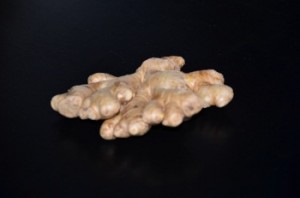 Also, ginger has shown to be very effective in treating travel sickness, whether you take it in the form of capsules, ginger spice powder or simply eat the plain ginger root.
Also, ginger has shown to be very effective in treating travel sickness, whether you take it in the form of capsules, ginger spice powder or simply eat the plain ginger root.
Another helpful remedy is 1 drop of mint oil diluted in a little water per hour.
You homeopath may give you remedies such as Colchicum for strong sensitivity to smells (perfume, exhaust, meals), Tabacum for severe nausea, icy coldness, paleness and sweat, or Cocculus for intensive vertigo accompanied by weakness and collapse.
What to do for an Upset Stomach or Acid Reflux?
Often, when we visit other regions and countries, we eat and drink differently. Those with a sensitive stomach can react with an upset stomach, acid reflux, nausea, a feeling of fullness or loss of appetite. If the complaints are simple, you can try some natural remedies.
The first step would be to fast for a day or two, while drinking plenty of fluids! Water, diluted fruit juices or vegetable juices, vegetable broth or herbal tea (chamomile, fennel, caraway) would all be suitable. Then, a light diet consisting of fresh vegetables including steamed vegetables, mashed potatoes and porridge should be followed.
Acidy foods and drinks should be avoided, including alcohol and coffee, cabbage, foods causing flatulence, tobacco, marinades, smoked foods, sausages, meats, mayonnaise, legumes, home fries, French fries, baked goods, sweets and rich meals. It is mandatory that you chew and insalvitate your food well! A glass of fresh potato juice taken with or in between the meals is a suitable dietary drink.
Some remedies which your homeopath may recommend are Nux vomica for bitter or sour belching with nausea and tendency to vomit, Carbo vegetabilis for belching of air, burning stomach pains, flatulence, feeling of fullness and extreme weakness, and Iris versicolor for nausea, sour belching, vomiting and headaches.
Stressed over Disturbed Sleep?
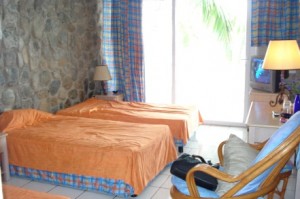 New surroundings with beds you are not used to can affect your sleep. You have problems relaxing or simply just sitting down to unwind. Often, affected persons take pills all too soon because it is the easiest thing to do. But this only a superficial solution – because sleeping pills act by dampening the central nervous system. The sleep brought about by these medications is totally different from natural sleep – it is in fact a sort of anaesthesia. The next day you usually feel dazed and unwell. Natural sleep aids which do not numb the person but increase the body’s willingness to sleep are much better. An old and many times proven sleeping aid is Valerian. You could take 20 drops diluted in a little water half an hour before bedtime and then again immediately before sleep.
New surroundings with beds you are not used to can affect your sleep. You have problems relaxing or simply just sitting down to unwind. Often, affected persons take pills all too soon because it is the easiest thing to do. But this only a superficial solution – because sleeping pills act by dampening the central nervous system. The sleep brought about by these medications is totally different from natural sleep – it is in fact a sort of anaesthesia. The next day you usually feel dazed and unwell. Natural sleep aids which do not numb the person but increase the body’s willingness to sleep are much better. An old and many times proven sleeping aid is Valerian. You could take 20 drops diluted in a little water half an hour before bedtime and then again immediately before sleep.
To help you fall asleep you can also drink some herbal tea with orange blossoms. You would take 1 tsp. full in a cup with boiling water, let it seep for 5 minutes and then filter it off. Drink it either unsweetened or sweetened with honey, sip by sip, 1 to 2 hours before going to sleep.
Additionally, you could take an herbal bath with linden blossoms. To prepare the bath, you would take a handful of dried blossoms in a liter of boiling hot water, let it seep for five minutes and filter it off. The linden blossom extract is then added to your bath water. Relax in the tub for about 15 minutes at a comfortable temperature of about 37 deg. C.
Some examples of homeopathic remedies to encourage your natural sleep are: Zincum valerianicum for overexcitedness and nervousness, Coffea for sleeplessness due to activity of thoughts and internal unrest and Cocculus for jetlag (sleeplessness due to time change), weakness and dizziness, and being too tired to be able to sleep. Your homeopath will select just the right remedy for you.
Irene Schwens, Clinic Director/Homeopath
